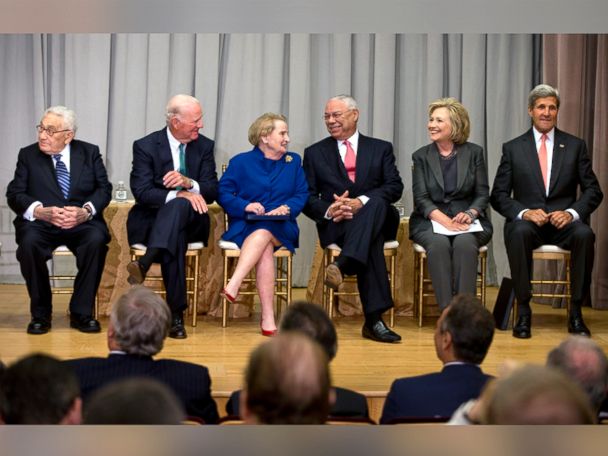What 5 Former Secretaries of State Say About Worldwide Threats
As President Obama was overseas asserting his view of America's role in the world, five former secretaries of state gathered at their old workplace in Washington, D.C., giving glimpses into how they would handle this tumultuous period in American foreign policy.
The gathering, commemorating the groundbreaking for a new State Department museum for American diplomacy around the world, seemed especially symbolic as Obama comes under scrutiny for his handling of numerous challenges overseas, including the rising threat of Islamist terrorists in the Middle East, Russia's continued defiance in Ukraine and countless other urgent issues.
That backdrop did not seem lost on any of the speakers, including former Secretary James Baker, who noted the importance of strong US diplomacy while so much of the world is in upheaval.
"During tough times like today, as crisis brews in the Ukraine, the entire Middle East burns, tension rises in the Middle East and terrorism grows stronger, not weaker, diplomacy is going to play an important role in peacefully resolving the challenges that we face," Baker, who served under the President George H.W. Bush, said.
Henry Kissinger, the first of the former secretaries to speak in chronological order, stressed the importance of having a clear overall strategy in place.
"It is imperative to outline the concept of what our country is trying to do as to prevent foreign policy from becoming a series of tactical issues," Kissinger, who served under Presidents Richard Nixon and Gerald Ford, said.
Kissinger was not explicitly referring to any leaders' policy in particular, but his remarks were particularly salient given that Obama had just spoken earlier about his goal for combating the Islamic State of Iraq and Syria, otherwise known as ISIS, in which he laid out several seemingly contradictory objectives, first saying the goal is to "destroy" the group and then later saying it was making ISIS a "manageable problem."

Secretary of State John Kerry, right, accompanied by his predecessors, participates in the groundbreaking ceremony for the U.S. Diplomacy Center, Sept. 3, 2014, at the State Department in Washington. From left are, Henry Kissinger, James A. Baker III, Madeleine Albright, Colin Powell, Hillary Rodham Clinton and Kerry. Carolyn Kaster/AP Photo.
The president's remarks also came up during remarks by Madeline Albright, who served in the Clinton administration and was explicit in her praise of Obama, who spoke in Tallinn, Estonia, where he visited before the NATO summit in Wales.
"I was very proud to listen to President Obama today in Estonia really say how we had to defend our allies and our values," she said.
Gen. Colin Powell spoke about the need to maintain relationships with countries even if they are not perfect allies, remarks that could be applicable to the United States' current ties with Russia.
"We talk to friends and adversaries. We work with adversaries to make sure they do not become enemies. This is vital work. This is work that is in the best interest of the nation," Powell, who served under President George W. Bush, said.
Hillary Clinton, the most recent predecessor to current Secretary John Kerry, spoke about diplomacy being "at the heart of America's leadership," but touched on her own accomplishments at the State Department, including boosting Foggy Bottom's social media IQ.
"By 2013 more than 2.6 million Twitter users followed 301 official feeds in 11 languages. And our diplomats, particularly our ambassadors but up and down the ranks, were developing their own Facebook pages and their own Twitter accounts," she said.
Despite her clear but understated effort to highlight a personal success at State, Clinton's presidential ambitions went almost completely unremarked-upon, except for a sly reference by Kissinger.
Speaking about the exclusive club of former secretaries that he belongs to, Kissinger said "we will never do anything more challenging in our lives" than serve in that role.
"I would say all of us… except one," he added.